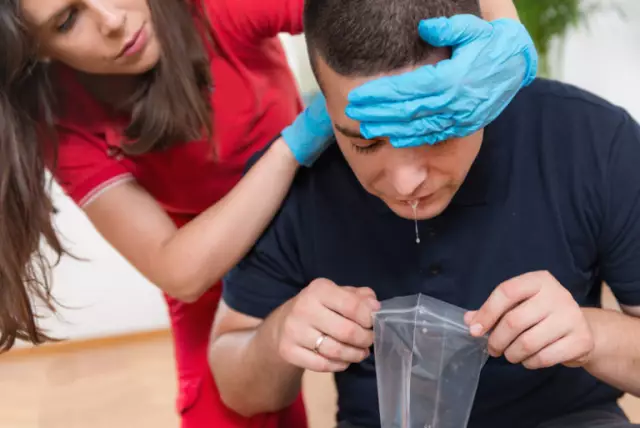- Author Rachel Wainwright wainwright@abchealthonline.com.
- Public 2023-12-15 07:39.
- Last modified 2025-11-02 20:14.
Dioxin poisoning
Dioxins (full name - polychlorinated dibenzodioxin) are a group of organic compounds formed by combustion products of substances containing chlorine and bromine.

Source: depositphotos.com
Dioxins enter the environment as a result of emissions from chemical enterprises that produce polyethylene, plastics, mineral fertilizers, and paper. Particles of harmful emissions are in the air, penetrate the soil and water, contaminating them. Then the poison accumulates in plants, as well as in the tissues of animals that eat them.
Dioxins are also formed during the usual boiling of chlorinated water.
How does dioxin poisoning occur?
Dioxins belong to the group of poisons with a cumulative effect: penetrating into the body, they gradually accumulate in it, being deposited mainly in adipose tissue, and when their concentration becomes high, symptoms of poisoning appear.
The lethal dose of dioxin is 6-10 g per kilogram of body weight, but the threshold dose that causes symptoms of poisoning is much lower. When the threshold dose is exceeded, the poison begins to damage cellular enzymes, thereby disrupting the normal course of biochemical reactions. Sex cells are significantly affected, which causes the mutagenic effect of dioxin.
It is important to note: the presence of dioxin in the body increases its sensitivity to the effects of other toxic substances, including salts of mercury and lead, cadmium, sulfides, nitrates, chlorophenols.
Dioxin intoxication enhances the damaging effect of ionizing radiation, which significantly increases the risk of developing malignant neoplasms.
Poisoning symptoms
Dioxins enter the body through the digestive tract or through the respiratory tract. The toxic effect manifests itself after a long time from the beginning of the entry of the poison into the body. Signs of dioxin poisoning:
- a sharp decrease in appetite, up to a complete refusal to eat;
- exhaustion;
- severe muscle weakness;
- characteristic changes in the picture of peripheral blood (leukocytosis, neutrophilia, eosinopenia and lymphopenia).
In the future, symptomatology develops due to damage to immunocompetent tissues and the liver, as well as pancytopenic syndrome:
- swelling of the face, and later the whole body;
- effusion in the pericardial cavity, pleural and abdominal cavities.
In less severe dioxin poisoning, the pathological process proceeds with mild symptoms and can last for several years. Symptoms in this case are associated with metabolic disorders and damage to endodermal and exodermal tissues (skin, intestines, stomach, liver). The defeat of the lymphoid and nervous tissue becomes the cause of the disorder of the functions of the nervous and endocrine systems.
Mild dioxin poisoning often manifests itself with only one symptom - chloracne, specific acne. Their appearance is associated with disorders of lipid metabolism and blockage of the ducts of the sebaceous glands, which leads to the development of an inflammatory process in them.

Source: depositphotos.com
First aid for dioxin poisoning
Given that the symptoms of dioxin poisoning develop over a long period of time, there is no need for first aid.
When is medical attention needed?
If you suspect dioxin poisoning, seek medical attention as soon as possible.
There are no specific antidotes to dioxin, symptomatic therapy is prescribed to improve metabolism and correct impaired functions of internal organs. To accelerate the elimination of the poison from the body, repeated sessions of plasmapheresis are carried out, followed by replacement plasma transfusions.
With the development of pancytopenia, blood transfusions, transfusion of blood components (leukocyte, platelet or erythrocyte mass) may be required.
Prevention
Prevention of dioxin poisoning requires compliance with the following rules:
- do not hunt or fish near chemical plants;
- do not eat plant products grown in an unknown place and do not have the necessary sanitary and hygienic certificates;
- do not drink chlorinated water, especially after boiling it;
- do not burn plastic products in personal plots or public spaces, do not try to dispose of any chemical substances, such as mineral fertilizers, on your own.
YouTube video related to the article:

Elena Minkina Doctor anesthesiologist-resuscitator About the author
Education: graduated from the Tashkent State Medical Institute, specializing in general medicine in 1991. Repeatedly passed refresher courses.
Work experience: anesthesiologist-resuscitator of the city maternity complex, resuscitator of the hemodialysis department.
The information is generalized and provided for informational purposes only. At the first sign of illness, see your doctor. Self-medication is hazardous to health!






